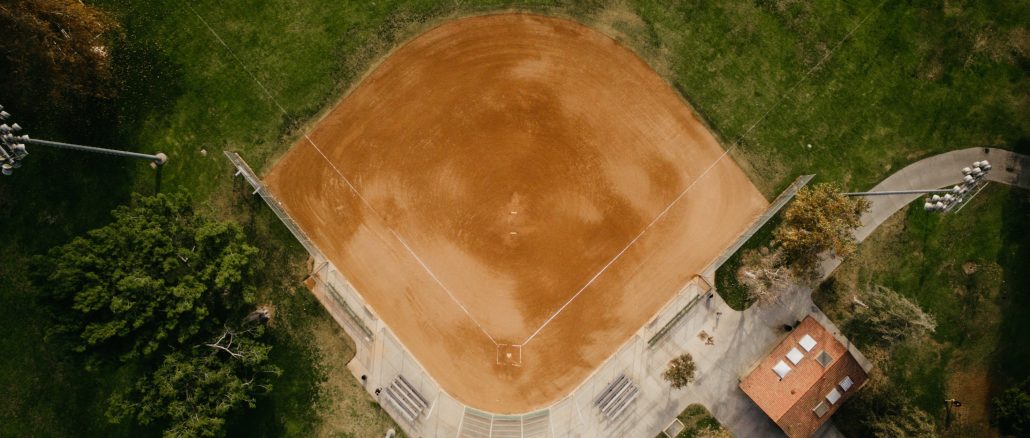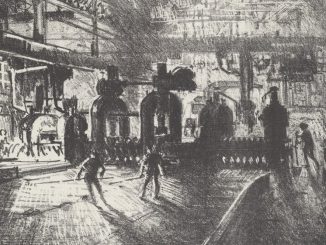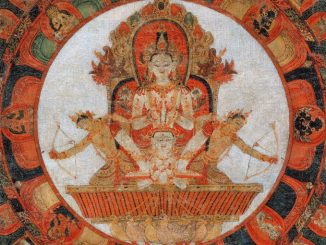
Robin Gow reflects on his relationship with his father when they used to play softball together. He recalls the only time he saw his father cry was watching Field of Dreams and explores how the themes of that movie apply to both of their lives.
I didn’t know why players took practice swings outside the box but I did it anyway, three in a row. The four wracks of ballfield lights, crooked-tooth, grinned at me. They multiplied my shadow in the reddish dirt.
This is how a baseball story ends: it’s the bottom of the 9th (actually the 7th because the girl’s league only played 7 innings). There’s 2 outs and we’re at the end of the line-up. The Teal Team down one point. A runner on second.
Dad crouched in the dugout in front of a bench full of sixth-grade girls, his fingers through the chain link fence.
The only time I can remember seeing Dad cry was when he told us about the movie Field of Dreams. The movie’s protagonist, an Iowa farmer who builds a baseball field between his corn plots, has little to do with us, other than, maybe, the fact that our house is surrounded by corn fields and my father is a builder. There’s a wall of tools in the basement. Three Phillip’s head screwdrivers and a whole family of hammers. The table saw. Pails of paint. Coarse-brown rusted wrenches.
He takes three cans of Diet Coke to work at Deka Batteries. They use his fingers to clip wires. He works ten hours. He comes home. I think if we had more land behind our house he might have built a ball field.
Before we had even watched the movie Field of Dreams together, he talked about it as if it were a sacred text. The first time he brought it up was one night, as he was sitting in the rocking chair waiting for Billy and I to fall asleep. I tried to keep him talking as long as possible to put off the inevitable obligation to fall asleep. On my side, I pulled the blanket up to my chin. “Dad?”
“Yes?”
“Do you have a favorite movie?”
He leaned forward, beginning to bounce his foot like he does when he’s excited about something. “So, this farmer. He starts to hear a voice telling him ‘if you build it he will come.’ He knows it’s about a baseball field. Everyone thinks he’s crazy, but he starts anyway. Invests everything in it.”
“Who will come?”
“A whole bunch of baseball players—Shoeless Joe. Babe Ruth. All the big guys.”
At the end of the ball season in late June, Dad would take down the billboards from the parameter of the field and use them as lumber, slicing them into manageable fragments.
I signed up for baseball for my dad, as all boys do only it wasn’t baseball it was softball. He kept a paint bucket of the fat bright green balls inside the door of the garage. He’d pitch against the side of the house. Smacking the shingles. Sitting in the living room I felt each thwack. He had never pitched a softball before I started playing.
A softball is not a baseball. Occasionally, I would feel strange about the softball, like it was not quite as real as a baseball. I would ask Dad to throw me baseballs like he did for Billy. I told him that once I was older I would play baseball and they would have to let me play because I would be so good that they wouldn’t want to pass me up even though I was a girl.
I imagined myself at the plate, the crowd’s voices a flutter. She’s got the league record for home runs. She’s like Babe Ruth. How does it feel to be beat by a girl?
The first pitch came across the plate. A clean strike. I was looking out over the hill past the foul lines. The umpire was someone’s dad and he hesitated before shouting “Strike.” The catcher fumbled with the ball a second.
Watching a “little league” softball game can be quite a project, Dad never lost patience. He watched me closely. If I looked to him he would nod and gesture to me to re-focus.
A softball measures between 11.88 and 12.13 inches in circumference and weighs between 6.25 and 7.00 ounces; a baseball measures between 9.00 and 9.25 inches in circumference and weighs between 5.00 and 5.25 ounces. The baseball hurt my wrists when the aluminum bat made contact. I shook my hands and winced.
“You okay? You need to grip tighter.”
“No—I’m good. Let’s collect the balls.”
I dropped the bat in the gravel. Dad and I kneeled down to collect the softballs scattered around the batting cage. We would go through the bucket at least three times, about thirty softballs each time.
We started in the spring when there was still frost on the grass in the morning. I rubbed my goose-bump prickled arms from the passenger seat of my dad’s blue jeep. We parked behind the ball fields.
Dad liked the challenge of having to learn how to pitch underhand. The first year I played he threw a lot of balls. I always swung at them anyway, partially out of impatience and partially out of the desire to catapult every pitch into the rope ceiling of the cage.
That first summer I started playing he sought out college softball games for us to watch on TV. He would say, “The pitch is slower yeah, but it’s just so much more difficult. Anyone can throw overhand—it’s natural.”
The next three pitches were balls. High, higher, higher. I wanted to swing so badly. I clenched the bat. Pink knuckles. Flushed face. I stared out past the foul lines, which were only marked by the yellow poles on either end of the chain link fence where local billboards hung. Moyer’s Plumbing. Renninger’s Farmer’s Market. Pop’s Malt Shoppe. Mama’s Pizza.
The next ball was low but I swung anyway. The feeling of swinging and missing is very specific. On the latter half of the motion, knowing you have not succeeded, the arm slumps. I dropped the bat and it clanged in the dirt.
“Come on, Sarah. Come on.” Dad said.
Most of the girls in the dug-out weren’t paying attention. Most of them didn’t know I had one more strike till the game was over. They chatted, some digging in the snack cooler that the coach’s wife had brought. Sucking Capri Suns and thinking of going home to washing the orangish dirt off their bodies.
The softball games were never on SportsCenter so Dad would flick between the softball game and the real sports channel. The usual hosts bantering about big league batting averages and stats interjecting between the silences of women poised on the field—the sun as blaring as the game ball. Even today I find myself wanting to watch the sports channel because it reminds me of sitting with Dad. I don’t tell people this because there’s a certain connotation to men who watch SportsCenter. I’m made aware of my queerness when confronted with the hosts’ deep voices and statue-like stances on the screen. I feel like a softball. Green and un-ignorable. I don’t know what kind of man that makes me. A man who played softball and was a daughter.
I don’t think my dad will ever see me as a son. I dig in our old softball memories because back then I feel like he saw me. I was too young to really entirely be a girl or boy. We could play catch with the softball and the baseball. Pitching under and over, under and over. As I got older and kept playing on into high school I felt the lines get more defined, tighter. The girls on my team started to wear sports bras and buy pink headbands to keep their long hair out of their faces. I got a body. A body is something you receive, not from yourself but from the movements it makes toward the people it encounters. When I put my body on next to the other girls I always felt like I was attempting girl and not being girl. It would be twenty years before I would come out as transgender. Every time I see my dad I come out again but only with my body. My voice grows deeper with each hormone injection, the hair on my face getting thicker.
He has never called me by my chosen name and I don’t think he will. I don’t know if he can.
Build it, build it, build it.
When I was younger I didn’t think that softball should be on SportsCenter. Why would it? What history could it claim? Who were “The Greats”? No one is hearing dead softball players beckoning them to build a softball field out of their farmland. A league of whose own?
Dad skipped ahead when he summarized The Field of Dreams. He skipped the marital conflicts between the farmer and his wife. The wife (obviously) didn’t want him putting the family in debt for a mythical baseball field. Dad even skipped over the whole Black Sox Scandal subplot; the first prodigal players to emerge from the fields were said to have fixed the 1919 World Series. Say it Ain’t So Joe.
He focused on these fantastical men playing the game he had played and his dad had played and now that his daughter played. (But didn’t quite play—because the ball was green). He preached of the farmer building stadium seating, the night falling and the family all sitting together to watch in the cool fading summer.
Build it and he will come.
I asked Dad if we could play catch. There were only a handful of night games in a season. This was the last one for the 2008 Junior Teal Team. The field lights were still on. He’d bought me blue Gatorade and a cosmic brownie from the park’s snack hut in between innings. I offered to split the brownie, tearing the gooey square in half. He shook his head and just took a sip of his Diet Coke.
We sat our refreshments at the base of one of Kutztown parks grandfather-maple trees. Knotty-kneed and wearing the scars of teenage hearts knifed into the bark.
Dad took a baseball out from his pocket. Whenever we played catch we’d use the baseball. “It fits better in a glove,” He’d say. The smack of the ball against the leather mitt. Fingers on seams. Back and forth. He threw some tosses high up, descending from a freckled night sky. The moon, rolling in the dirt.
The part where Dad cries isn’t when the farmer’s dad comes to play catch with him at the end. Dad cries when one of the ghost-players exits the magic field, leaving his younger self behind. The player departs from the mythical to save the farmer’s daughter who’s choking.
Re-counting the story, he dabbed his wrist to the corner of his eyes as he sat in the rocking chair. He paused a few moments. The fan kept sighing and a pair of headlights blinked in my windows as a stray car went down Noble Street. In bed that night I wanted so badly to understand what had moved him about that.
I imagined him, like the farmer, up late in a woodshop hearing the call of dead men, only, not listening. The table saw, a sob or a sermon? A paintbrush waiting in a glass mug of brown water. What fields do we, must we, walk away from?
We wouldn’t watch the movie till years later. Side by side on the polka-dot couch. He didn’t cry then though, he only cried when he told the story, not when he watched it.
I disliked the batting cage because you never really got to see how far you were hitting anything. Each trajectory, inevitably lost in the netting. What I did like was to hear Dad’s interpretations of them. “That one was gone.” “Out of here.” “You should hit like that in a game.”
Of course, I struck out. Dad never said anything about it. We played catch. We finished our snacks. The blue jeep squealed when he turned the key.
I wanted to ask him if he thought I was any good. I still want to ask if he thinks I’m any good, only now I write poems that he says again and again “I don’t understand.” “I don’t get it.”
We speak different languages.
We drove home. I went to sleep after washing away the dirt.
I wonder, now, if he ever still thinks about the Field of Dreams. If he tells it to anyone; now that we’ve moved away and the buckets of balls in the garage that haven’t been caught for years.
I wonder if he ever imagines me, like the farmer, sitting at a desk, hearing the voices of dead men, baseball players and writers, crouched on my bookshelf.
Build it and he will come.
 ROBIN GOW‘s poetry has recently been published in POETRY, Furrow, carte blanche, FIVE:2:ONE, and Corbel Stone Press. He is a graduate student at Adelphi University pursing an MFA in Creative Writing. He runs two poetry blogs and serves as the production editor of the Lantern literary magazine and the poetry intern for Oyster River Pages. He is an out and proud bisexual transgender man passionate about LGBT issues. He loves poetry that lilts in and out of reality and his queerness is also the central axis of his work. He’s inspired trans and gender non-conforming poets like Eileen Myles and Alok Vaid-Menon.
ROBIN GOW‘s poetry has recently been published in POETRY, Furrow, carte blanche, FIVE:2:ONE, and Corbel Stone Press. He is a graduate student at Adelphi University pursing an MFA in Creative Writing. He runs two poetry blogs and serves as the production editor of the Lantern literary magazine and the poetry intern for Oyster River Pages. He is an out and proud bisexual transgender man passionate about LGBT issues. He loves poetry that lilts in and out of reality and his queerness is also the central axis of his work. He’s inspired trans and gender non-conforming poets like Eileen Myles and Alok Vaid-Menon.
Featured image: Francisco Gonzalez photograph on Unsplash.



1 Trackback / Pingback
Comments are closed.